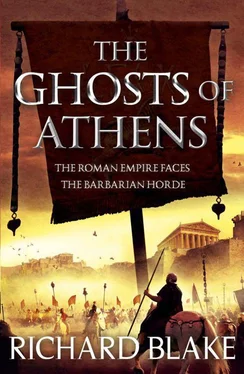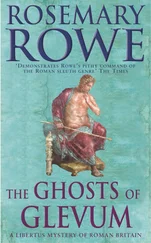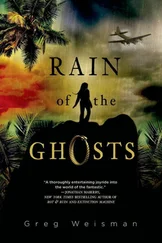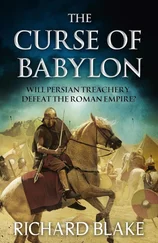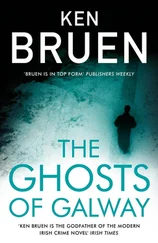Richard Blake - The Ghosts of Athens
Здесь есть возможность читать онлайн «Richard Blake - The Ghosts of Athens» весь текст электронной книги совершенно бесплатно (целиком полную версию без сокращений). В некоторых случаях можно слушать аудио, скачать через торрент в формате fb2 и присутствует краткое содержание. Год выпуска: 2012, Издательство: Hodder & Stoughton, Жанр: Исторические приключения, на английском языке. Описание произведения, (предисловие) а так же отзывы посетителей доступны на портале библиотеки ЛибКат.
- Название:The Ghosts of Athens
- Автор:
- Издательство:Hodder & Stoughton
- Жанр:
- Год:2012
- ISBN:нет данных
- Рейтинг книги:3 / 5. Голосов: 1
-
Избранное:Добавить в избранное
- Отзывы:
-
Ваша оценка:
- 60
- 1
- 2
- 3
- 4
- 5
The Ghosts of Athens: краткое содержание, описание и аннотация
Предлагаем к чтению аннотацию, описание, краткое содержание или предисловие (зависит от того, что написал сам автор книги «The Ghosts of Athens»). Если вы не нашли необходимую информацию о книге — напишите в комментариях, мы постараемся отыскать её.
The Ghosts of Athens — читать онлайн бесплатно полную книгу (весь текст) целиком
Ниже представлен текст книги, разбитый по страницам. Система сохранения места последней прочитанной страницы, позволяет с удобством читать онлайн бесплатно книгу «The Ghosts of Athens», без необходимости каждый раз заново искать на чём Вы остановились. Поставьте закладку, и сможете в любой момент перейти на страницу, на которой закончили чтение.
Интервал:
Закладка:
Yet, whether I was asleep, or dreaming while awake, I certainly was back in Ctesiphon. Even as I reached out to grab lecherously at one of the firm breasts, I sensed a change in the quality of the artificial light; Chosroes and the girls were continuing as if nothing odd had taken place about us. But I looked up and saw that we were all now in the great, vaulted cellar that only the closest and most trusted companions of the Great King were allowed to see — allowed, that is, to see and be let out again. All about us, each on its own couch, lay the remains of the family members and generals and ministers he’d killed throughout his reign. Women, children, babies still suckling when he’d snatched them away, old and young men: all lay as he himself had arranged them to mummify in the dry air, each with a label pinned to the right ear that he’d written out in his own hand to remind him of names and genealogies. The couches were arranged about us in their hundreds. They reached over to every one of the far walls. In a while, Chosroes would snigger and get up, and call on me to help get this latest victim on to a couch. None would ever dare comment on his absence from the Royal Council. None would dare notice when his name was erased from every public document. His own wives and children would never dare so much as to whisper his name to each other in the dark. Once more, Alaric the Magnificent had bought time for beleaguered Constantinople, and for the drivelling fool of an Emperor who sheltered behind its walls.
And now those massed and flaring torches dimmed, and I was certainly awake in Canterbury. How long I’d lain here aware of myself I couldn’t say. Never speak in the same breath of opium and any clear sense of time. Sweating in the darkness, I lay with no company now but Jeremy and the sound of his snoring. Then he stopped. As I yawned and prepared to turn over, he let out a long sicky burp. Then he farted. Then he was back to snoring.
‘This really won’t do!’ I muttered. I clutched the side of my cot and sat up. Keeping the blanket about my shoulders, I forced myself to stand. I reached for my stick. It must have fallen down when Jeremy tried to wake me. I gave up on patting about for it, and walked unsteadily over to the window. The main shutters were bolted, and I’d have needed a chair to get at the top one — a chair and a lamp, and someone to hold me steady as I reached up to undo it. But, feeling round in the dark, I found a smaller opening about a foot square. I pulled it open. Gripping the back of a chair, I leaned forward and let the chilly night air dry the sweat from my face.
If the rain had finally let up, there was still a mass of clouds overhead, and I really might have been looking out with my eyes shut. But, if chilly, the breeze was a welcome change from the various smells that Jeremy had issued.
I thought of the brief and highly censored story I’d given to the boy. It was nearly eighty years since I’d first arrived in Canterbury. In this time, it had grown from a cluster of mission buildings into what even I, who’d lived so much of that time in the Empire, had to admit was a city of respectable size. Five hundred dwellings, the Abbot had told me over supper. He’d gone so far as to assure me the place compared well with his native Milan. I didn’t suppose he was exaggerating. Plague and the Lombards had long since finished the Empire’s work of devastation in Italy.
But there was no doubt how Canterbury had grown. Eighty years was a long time to be away, and Canterbury had changed and changed again in its growth. If I looked straight ahead into the darkness, the big church was perhaps a little on my right. If so, I couldn’t be that far from where the mission library had been. In a side room of this, Maximin had unpacked the boxes he’d brought with him from Ravenna and begun his dispute with the Bishop’s secretary over possession.
I thought again of Maximin. For most of the previous eighty years, thinking of that name had mostly called up images of the child I’d named after him, not of the man himself. Tonight in Canterbury brought his face clearly to mind. I thought of how he’d saved me from Ethelbert, and how I’d finally avenged his death. I thought of his taste for opium — one of the few creditable things he had taught me. I thought of his wondrous ability to combine superstition and fraud, without once considering that, if his own were faked, all other miracles might somehow be in doubt. I thought of how dearly I’d loved him, and how I’d felt when I looked at his bloody corpse while the sun moved quickly down the Column of Phocas in Rome. I thought of Maximin, and I thought of them all: Ethelred, and that pretty girl and her child who may or may not have been born and who may or may not have lived, and my mother and what little I recalled of my father. And I thought of Martin and the Dispensator, and Priscus and Phocas and Heraclius, and all the others who’d gone into the darkness so long before I ever would. As I leaned there, looking out into the darkness, they and many, many others crowded back into memory as if they’d been petitioners in Constantinople, all racing to be first to touch the wide purple hem of my robe.
I stiffened and gripped harder on the chair. Was that a noise outside? I turned my good ear into the opening and listened hard. I thought at first I’d been mistaken. Behind me, the loud but even rhythm of Jeremy’s snoring broke down into another long burp. As he fell comparatively silent, I listened again. Yes, there were noises outside — it was the scrape of leather sandals on gravel and the faint sound of voices.
‘There was no need for you to come over,’ I heard the Abbot whisper just a few yards away in the darkness. ‘He ate little and drank too much. I put him and his boy to bed in the good room, just as you directed.’ He spoke the clipped, irregular Latin that Italians use when they aren’t putting on any airs and graces to foreigners.
The reply was a soft but disapproving sniff. ‘Even so, I did give orders to be notified of his safe arrival and probable health.’ It was Sophronius. You’d never mistake that rich tone, though subdued, or the exaggeratedly correct Latin. ‘I haven’t come all this way to deal with another drivelling old fool.’
The Abbot now had his back to me, and I didn’t catch what he said.
‘Yes, I could have gone to Jarrow,’ Sophronius answered, filling in the blank in the conversation. ‘But, if His Grace chooses to arrange things in this manner, who am I to disagree?’
With increasing gaps in my hearing of it, the conversation moved to other business. So far as I could gather, Sophronius wanted an inspection of the Abbot’s school, but was being put off. ‘Spare the rod, spoil the child,’ he said with sudden loudness. His voice dropped to a murmur I couldn’t follow. I think the Abbot was speaking about an outbreak of fever among the boys. Once or twice, I heard Sophronius laugh. There was a double repetition of ‘Spare the rod, spoil the child,’ and a long and anticipatory laugh. But the crunch of leather on gravel was growing more distant, and I was alone again.
Bugger all was what I’d learned from this act of involuntary snooping. I’d guessed back in Jarrow that Theodore wasn’t inviting me over for an informal natter about the old days. He’d said as much before nodding off in our meeting. Well, I’d find out soon enough what the Church wanted of me — or I might if the old dear managed to stay awake this time. Until then, I didn’t think I’d burst with curiosity.
I was about to close up the opening in the shutters and feel my way back to bed, when I heard Jeremy groan and shift position till the bed boards creaked beneath him. He followed this with a fair impression of a death rattle and a return to snoring. I pulled a face, then smiled again. I pushed my face out into the fresh air and breathed in the smell of early shrubs.
Читать дальшеИнтервал:
Закладка:
Похожие книги на «The Ghosts of Athens»
Представляем Вашему вниманию похожие книги на «The Ghosts of Athens» списком для выбора. Мы отобрали схожую по названию и смыслу литературу в надежде предоставить читателям больше вариантов отыскать новые, интересные, ещё непрочитанные произведения.
Обсуждение, отзывы о книге «The Ghosts of Athens» и просто собственные мнения читателей. Оставьте ваши комментарии, напишите, что Вы думаете о произведении, его смысле или главных героях. Укажите что конкретно понравилось, а что нет, и почему Вы так считаете.
